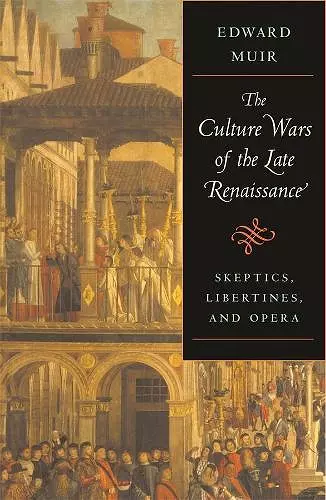The Culture Wars of the Late Renaissance
Skeptics, Libertines, and Opera
Format:Hardback
Publisher:Harvard University Press
Published:14th Jun '07
Currently unavailable, and unfortunately no date known when it will be back

In the summer of 1591 students from the University of Padua attacked the local Jesuit college and successfully appealed to the Venetian Senate to intervene on behalf of the university. When the Jesuits were expelled from the Venetian dominion a few years later, religious censorship was virtually eliminated. The result was a remarkable era of cultural innovation that promoted free inquiry in the face of philosophical and theological orthodoxy, advocated libertine morals, critiqued the tyranny of aristocratic fathers over their daughters, and expanded the theatrical potential of grand opera.
In Padua a faction of university faculty, including Galileo Galilei and the philosopher Cesare Cremonini, pursued an open and free inquiry into astronomy and philosophy. In Venice some of Cremonini's students founded the Accademia degli Incogniti (Academy of the Unknowns), one of whose most notorious members was the brilliant polemicist Ferrante Pallavicino.
The execution of Pallavicino for his writings attacking Pope Urban VIII silenced the more outrageous members of the Incogniti, who soon turned to writing libretti for operas. The final phase of the Venetian culture wars pitted commercial opera, with its female performers and racy plot lines, against the decorous model of Jesuit theater. The libertine inclinations of the Incogniti suffuse many of the operas written in the 1640s, especially Monteverdi's masterpiece, L'Incoronazione di Poppea.
Edward Muir's exploration of an earlier age of anxiety reveals the distinguished past of today's culture wars, including debates about the place of women in society, the clash between science and faith, and the power of the arts to stir emotions.
Finding the roots of opera in the history of science is a task that would daunt even a polymath of Renaissance stature. Yet in The Culture Wars of the Late Renaissance, Edward Muir plausibly explains how the skepticism taught by a professor at the University of Padua in the early 17th century fostered a musical revolution in neighboring Venice--and much else besides. -- Francis X. Rocca * Wall Street Journal *
Muir's small book (hard-covered but paperback in dimensions) set me thinking. It's a remarkably readable, cross-disciplinary study. -- Clifford Bartlett * Journal of Japanese Studies *
- Nominated for Helen and Howard R. Marraro Prize 2008
ISBN: 9780674024816
Dimensions: unknown
Weight: unknown
192 pages